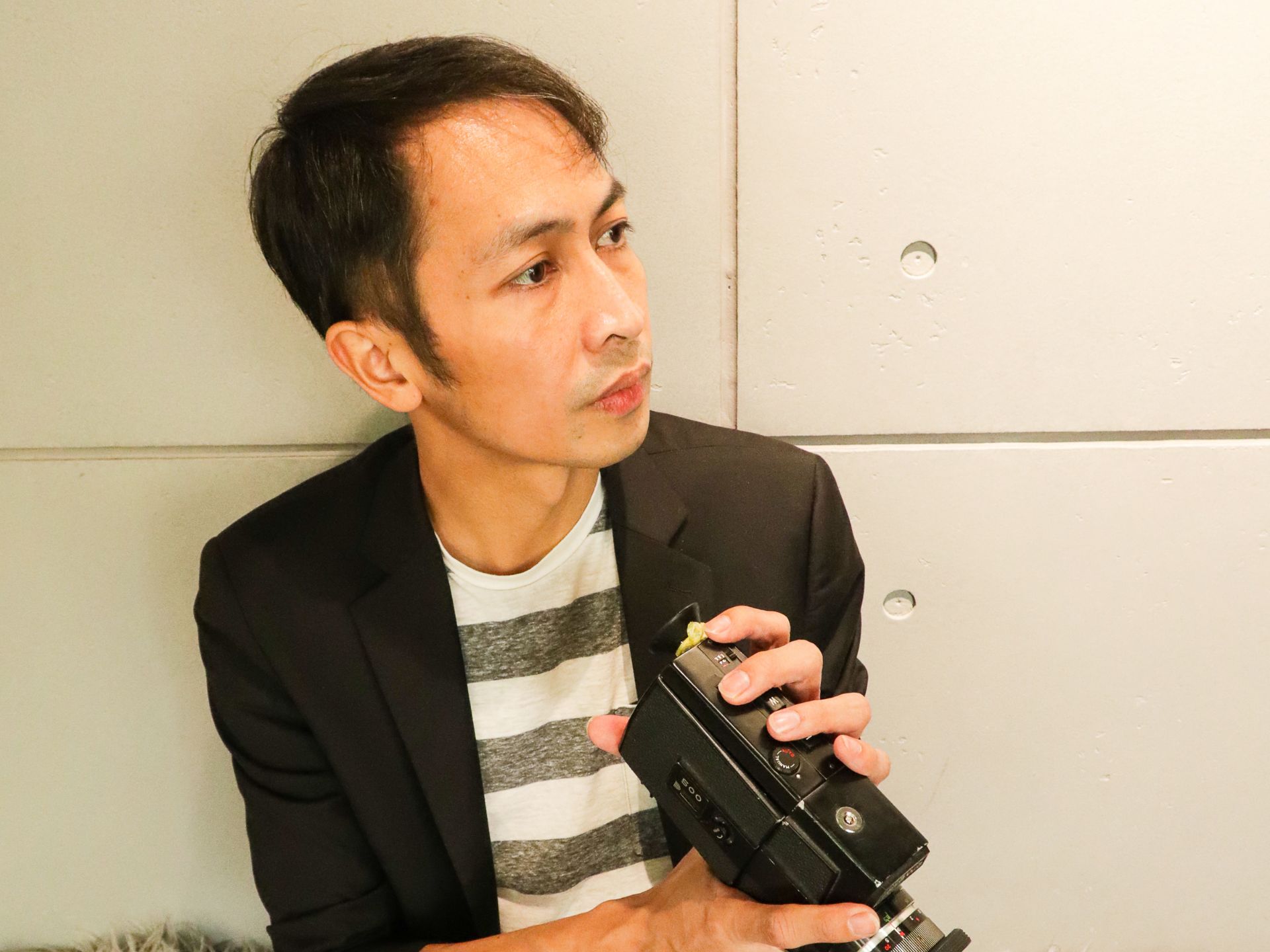BiG Talk : Abdul Zainidi


by Jia Ying Chia |
Love him or not, Abdul Zainidi is perhaps the most (in)famous filmmaker in Brunei. His penchant for surrealism and often unconventional approach to films, leaves much food for thought particularly in a community more accustomed to Hollywood-style movies and scripts. He’s tirelessly travelled the international film festival circuit with his cache of films including his latest, Vanishing Children Triangle, which is a 100% Malay-language film with Tutong dialect, and has most recently graduated from the Busan Asian Film School. We caught the man behind the myth for a quick chat about all things film and the joys of being weird.
Thanks for taking the time out for us, what’s going on with you right now?
Zainidi: I’m still making films – not as extensively as before – because I’m kind of busy nowadays in my personal life. I’ve been travelling for film festivals. I came back most recently from Davao in the Philippines, where ‘Vanishing Children’ was selected for the Ngilngig Fantastic Asian Film Festival. They reacted quite well to it. You know, we have lots of superstitions in Brunei and Vanishing Children was originally a short film that I developed into a feature length. It’s chapters of stories about a group of vanishing children, and (local) superstitions like not going into a house without saying a small prayer, not going out after Maghrib, stuff like this – you might be taken or hidden away after seeing things. A lot of the films I make nowadays incorporate special needs children with no prior acting experience. I give them an opportunity, as it were, to act. So, in Vanishing Children we incorporated sign language into two chapters of the film and I’ve quite always emphasised on the OKP (Orang Kurang Pendengaran) or hearing-impaired community.
That’s impressive- How’s that experience been? Are there any particular memories from working with them that have stuck with you?
Zainidi: You feel like a parent, like you’re nurturing them and passing on what you’ve learnt, I guess. The same thing applies to directing these types of ‘non-actors’. It’s a challenge. Because I’ve lived and had experiences overseas for quite some time, I always like to share my creative experience through workshops and stuff when I’m back in Brunei. You have to invest a lot of time and energy and they have a different patience span to us so they can get irritated or very tired easily. You can’t be too forceful, just assure them that they can do it. I think that’s the job whether you have children or not – as a teacher, leader, mentor, I think your responsibility is trying to assure (people) that they can do their best… and that’s the fondest thing I’ve remembered working with these kids. That when you give them belief, they have belief in themselves. That’s something I take back every day with me and that I’m very proud of (chuckles). When you see it finally on screen you’re thinking “Oh man, it wasn’t easy, but it worked out”. (laughs) It’s exhausting but it’s worth it.
You’re known for being weird and wacky, and not one to shy away from doing things outside the box. Where does that interest – to look at those ideas and turn it into something wonderfully cinematic – come from?
Zainidi: I think the ‘weird’ is something I’ve always personally related to. I’ve always felt that I’ve been different in any case, so I feel like if you’re comfortable with who you are, your work speaks for itself. I guess my films are kind of an extension of who I am, like when I talk about symbolism, surrealism or what’s going on here, it’s kind of like my subconscious being displayed. People ask why I do such difficult subject matter; people don’t get it sometimes, and the reason is that maybe we don’t need to always be spoon fed? Everyone has a different view of life and I feel that my view can sometimes be abstract, and I try to show that in my films. Some people get it, like they’ve been in a period of life where they were depressed and they could see where I was going with things in the movies. It’s all about emotion and how people relate to that. I think if you look into (it), there could be a different message for anyone.
Relating that to abstractness versus commercial viability, how have you navigated that as a career filmmaker?
Zainidi: As a Bruneian film maker, we have more and more movies being produced and fortunately some of them have good backing for sponsorship and publicity. I’ve always been the kind of indie filmmaker that’s relied more on the story I make, but I believe that the Vanishing Children Triangle was one of the most successful films I’ve had in Brunei because it was released and supported by the Ministry of Tourism for the Brunei December Festival. It did quite well, I posted the trailer on my TikTok and it went completely viral. People were intrigued by the fact it was a film with special needs children. People who managed to catch the premiere really liked the film. It’s different from a typical movie; the acting, the story and also the theme is very different and dark I guess, but surprisingly had an audience. With the generous backing of Empire cinema and Brunei Tourism’s December Festival, and its showing at other film festivals, we also had a lot more people aware of the work. In terms of the way Vanishing Children was understood, it was definitely my most accessible work compared to my previous film The Worm and the Widow. That was so philosophical; there were so many questions, and I don’t like to answer them. I like for people to come up with their own ideas, and I think that people really did not understand that concept of abstract film there.
Have there been any directorial or cinematic inspirations for the work that you do?
Zainidi: Yeah, I’m a big fan of French cinema particularly the works of Luis Buñuel- he does abstract works like ‘why put a needle in your eye’, that kind of gore, but then there’s always a message behind it. It could be protesting about a certain way of doing things, something like that. And I’ve always liked the quietness of European cinema, similar to Japanese and Korean cinema. There’s a sort of quietness where you have scenes in which nothing is happening and then ‘boom’. There’s a reason for it happening. I have many inspirations; David Lynch is one of my favourite directors, he’s very abstract and very surreal. He can make a hallway turn into the scariest place on earth just by the way he films it. I’ve always liked atmosphere; I think it’s important whatever the genre. The way you film or set up a particular place is very important because that helps your film and characters breathe. You can’t have too much. It’s not a Michael Bay film or like Bad Boys (laughs). It doesn’t mean I won’t ever try doing an action film, I like those things, Martin Scorsese. I like experimenting. I like doing things I’m not used to so that’s why I turned to comedy and TikTok.
Speaking of, where did that character come from? It’s taken off on TikTok
Zainidi: Yeah haha! I’m so proud of it but at the same time I get so tired of playing him. I mean, Faris is very popular in Brunei. I think it just came from a desire to do something in front of the screen. I like to be polyvalent – I like to do many things; I’m a writer, director, sometimes cameraman, and actor. My background has mainly been in acting. The idea of Faris and the cousin came from a film actually by Jim Jarmusch called ‘Coffee and Cigarettes’ and there’s a scene where Cate Blanchett plays two identical characters – a rich, snobby woman meeting her lower class cousin – and I liked that. I thought, ‘I want to make something like that one day’.
Recent Posts
Immerse in the Spirit of Ramadhan in Brunei
Sponsored by Brunei Tourism As the holy month of Ramadhan graces Brunei, the country transforms…
BiG Buzz : MANTAP Poised to Boost Brunei Food Economy and Security
Written by Aliyah Ming & Ying Chia [gallery size="full" columns="1" ids="25822"] The entry of Mantap…
BiG Buzz : Take Off to Balikpapan with Royal Brunei
[gallery size="full" columns="1" ids="25813"] After a 24-year hiatus, the Brunei-Balikpapan direct flight has made a…
BiG Buzz : 1, 2, 3, KOPI!
[gallery size="full" columns="2" ids="25837,25838,25839,25840"] How much coffee can you drink? Well, at the 7th annual…
BiG Buzz : Grass is Greener Here
[gallery size="full" columns="1" ids="25832"] [gallery size="full" ids="25831,25834,25833"] The importance of sustainability has been a pressing…
BiG Buzz : Borneo Jazz is back!
[gallery size="full" columns="1" ids="25400"] Get ready for a jazzy good time as the Borneo Jazz…


